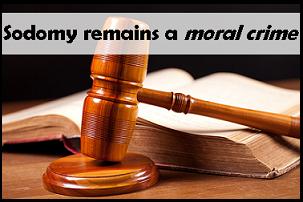Homosexuality & The Bible
Homosexuality & The Bible
In March of 2000, the Federal Government of Canada voted to approve legislation that would give same-sex couples identical status and rights as common-law heterosexual couples. The vote carried in the House 137-118.
Canada, while leading in little else on the world’s stage, is receiving top marks for moral decline as the passive voice of the Canadian people is drowned out by minority activism. The aggressive lobbying of the proponents of a “new morality” has paid off, and the prophets of liberal thought are rejoicing in their success.
Over 30 years ago, Francis Shaeffer wrote regarding the future of ethics,
The thinkables of the eighties and nineties will certainly include things which most people today find unthinkable and immoral, even unimaginable and too extreme to suggest. Yet – since they do not have some overriding principle that takes them beyond relativistic thinking – when these become thinkable and acceptable in the eighties and nineties, most people will not even remember that they were unthinkable in the seventies.
Since the beginning of time, homosexuality was a heinous sin. Whether one studies the ethical writings surrounding the Old Testament, the New Testament, the Early Church, the Middle Ages, and the Reformation, homosexuality has unanimously been condemned as sinful. And it has been so for over 6000 years for one simple reason – the Bible says it is a sin.
Now, at the dawn of the millennium, liberal theologians are telling us that homosexuality is natural, as apostate denominations lining up to welcome to their rolls, homosexual members, Sunday School teachers, elders, and even ministers! In spite of the modern onslaught of liberal thinking in the area of homosexuality and religion, the Bible remains unchanged on its position of condemning homosexuality as a great wickedness.
Creation⤒🔗
When the Lord gave us the Scriptures, he did not leave us without an interpretation of those Scriptures, but built into them a guide, or a rule, to discover His will in all matters of faith and life. Scriptures such as “Whatever I command you, be careful to observe it; you shall not add to it nor take away from it” (Deut 12:32). And, “You shall observe My judgments and keep My ordinances, to walk in them: I am the LORD your God” (Lev 18:4).

As followers of Christ, we are not free to draw our own conclusions or interpret the Scriptures in a private way. “Knowing this first, that no prophecy of Scripture is of any private interpretation” (2 Peter 1:20). In other words, the Bible is not a wax nose that can be twisted or manipulated to suit the face of our particular circumstance, nor is it to be used as a pretext machine that justifies all our closely held sins. To be a Christian means abandoning our sinful desires at the feet of Christ, denying ourselves, and taking up our cross and following Him (Mat 16:24).
When God created male and female, He did so, in part, to reflect the intimacy and unity of the Trinity. “Then God said, Let Us make man in Our image, according to Our likeness” (Gen 1:26). The creation edict dictates our understanding of God’s will in respect to sexual intimacy, love, and reproduction. Homosexuality is a distortion of the creation ordinance of marriage.
In Genesis 2:24 God tells us, “Therefore a man shall leave his father and mother and be joined to his wife, and they shall become one flesh.” From this point on, there should be no doubt as to what God intended in respect to fleshly or sexual union. John Murray states, “The prima facie sense in Genesis 2:24 is that one man is to be joined to one woman and that the two would become one flesh”. The word marriage is used 18 times in the Holy Scriptures, and in every instance it demands a female object.
All sexual union therefore (as the fruit of Genesis 2:24) is between male and female. We have absolutely no Biblical instance of God ever permitting a male/male, or female/female relationship in the sanctity of marriage, or in any other permissible circumstance pertaining to sexual union. In fact we have quite the opposite. But before we go any further let’s look at the first account of homosexuality in the Word, and discover what God is telling us about it.
Sodom←⤒🔗
In short, the men of Sodom demanded that Lot produce the two guests that they might “know” them (Gen 19:5). The end result was the citizens of Sodom were smitten with blindness and the city was destroyed by fire and brimstone. It is true that Sodom was guilty of far more than sexual perversion but it can’t go unnoticed that the men of Sodom wanted to “know” Lot’s guests.

Those that defend homosexuality from the Bible try to prove at this point that the Hebrew word “know” (yadha) is not the normal word used for homosexual activity (shakhabh) but is rather a more generic word for “get acquainted with”. The liberal interpretation of the story of Sodom goes something like this: As an alien resident in Sodom, Lot was responsible for introducing his guests to the established townsmen and letting them examine their credentials. For that reason the Sodomites asked to “know” Lot’s visitors. The Sodomites wanted to get to know Lot’s guests, to see where they were from, where they were going, and why they were in Sodom. Since (in the Eastern mind) a stranger had a right to hospitality, the Sodomites actions would appear to be overbearing and inhospitable. For such a breach of love and hospitality, God destroyed the city with fire and brimstone.
The problem is that the interpretation set forth above does not work if we take the rest of the story into account. Only if we leave the story in its isolated form is this conclusion possible.
First then, in context, we must see that the men of Sodom came to Lot and asked to “know” his guests. Lot’s response was to shut the door and characterized this request to “yadha” (know) the visitors as a great wickedness (See Genesis 19:6, 7). It is very strange to think that Lot would believe that a simple civic custom like getting to know the visitors would be a “great wickedness”. In fact to us it would seem quite hospitable to want to drop in on the new visitors to get to know them. Certainly this was not a warrant for divine destruction?
Second, why would Lot offer his virgin daughters in place of an introduction to his guests? The Sodomites were already acquainted with them, for Lot was a prominent man in Sodom by virtue of his location (he lived at the gate of the city, the most prominent place to reside. See Genesis 19:1). If these men were just wanting to “get to know” Lot’s visitors, then why does Lot turn around and say, “Take my daughters, they are virgins who have not been with a man, and you can do with them as you wish” (Genesis 19:7, 8). Has Lot gone mad? Would he exchange his daughter’s virginity for a short interview with his new guests? How insulted and shocked the Sodomites must have been to be propositioned in such a way! To be given a sexual bribe in exchange for a short visit, Lot would have to be crazy. And how does this square with the belief that Sodom was destroyed because of inhospitality? Surely the only inhospitable one in this story is Lot, yet he was saved from the city’s destruction.
Only those who want to avoid the obvious and natural meaning of these texts would say that they wanted to “know” the visitors in a generic, general way. The great wickedness in this text was sexual perversion in the form of homosexuality, and God destroyed Sodom for it.
The Law of God←⤒🔗
“You shall not lie with a male as with a woman. It is an abomination” (Lev 18:22). “If a man lies with a male as he lies with a woman, both of them have committed an abomination. They shall surely be put to death. Their blood shall be upon them” (Lev 20:13). It is impossible for the thinking man or woman to read the Scriptures quoted above and not see their objective. Still, some liberal theologians will argue that these laws set down in Leviticus were only for the nation of Israel, that these laws were strictly ceremonial in nature and are therefore terminated with the coming of the New Testament.

While we would agree that the specific laws known as ceremonial and judicial have expired with the nation of Israel, we still believe that the general equity of the moral law remains. The Westminster Confession says,
To them also, as a body politic, he gave sundry judicial laws, which expired together with the State of that people; not obliging any other now, further than the general equity thereof may require.
While it is true that certain laws were abolished with the coming of Christ (ceremonial laws), we are left with the moral portion of the Law even in the New Testament. Matthew 5:17, 18 says, “Do not think that I came to destroy the Law or the Prophets. I did not come to destroy but to fulfill. For assuredly, I say to you, till heaven and earth pass away, one jot or one tittle will by no means pass from the law till all is fulfilled.” The truth remains, that in respect to sodomy, there is a ceremonial feature (uncleanness) that was abolished with the final sacrifice of Christ. Nevertheless, sodomy remained a moral crime as well, falling under the judicial heading of the 7th commandment.
Sodomy was one of the few ceremonial laws that transcended its primary typical category and was firmly embedded in the judicial and moral laws. Furthermore, if Sodomy (as mentioned in Leviticus 18) was abolished with Israel, then so was incest (vv 6-17), adultery (v 20), and bestiality (v 23). The theologian who is arguing for a termination of the sin of sodomy is, by the same reasoning, arguing for the termination of every other sin mentioned in Leviticus 18.
The New Testament←⤒🔗
Romans chapter 1 tells us that even in the New Testament the principle of homosexuality is unchanged (Rom 1:22-28). Vile passions can only be interpreted in light of what we already know to be moral or immoral. The New Testament is off its hinge if we separate it from the moral grounding of the Old Testament.
Many current liberal theologians would like to take Romans 1 and place it in the context of the Greek culture found at the time of its writing instead of the Old Testament. That is why when we see words like “burned in their lust for one another, men with men committing what is shameful” in Romans 1, we have nothing to tell us what is being done here unless we look at the etymological root of male/male lusting. We can only do this through the viewfinder of the Old Testament. “Vile passions” is in direct relation to Leviticus 20:13 “If a man lies with a male as he lies with a woman, both of them have committed an abomination. They shall surely be put to death. Their blood shall be upon them.” It is very clear here what Romans 1 is speaking about.
Clever attempts have been made by the homosexual community to divest Paul of his clear condemnation of homosexuality and put a new twist on his words. This has been called the pederasty theory. In a nutshell this theory maintains that Paul was only condemning the sexual and emotional exploitation of boys. The problem with this line of reasoning is we have absolutely no mention of boys in Romans 1, only men. As well, if the Apostle was speaking about the sexual exploitation of minors in Romans 1:27, doesn’t the problem of Leviticus 18 come back and haunt the exegete? If pedophilia was abolished with sodomy at the coming of Christ in the ceremonial law, why then would Paul be condemning pederasty in Romans 1?
Lastly, Jude 7 interprets the story of Sodom for us. What better interpreter of the Scriptures are there than the Scriptures? It is quite clear that Sodom was destroyed because of sexual immorality. “Even as Sodom and Gomorrah, and the cities about them in like manner, giving themselves over to fornication, and going after strange flesh, are set forth for an example, suffering the vengeance of eternal fire.” What is this strange flesh? Jamison, Faussett and Brown believe it to be “departing from the course of nature, and going after that which is unnatural”.
Conclusion←⤒🔗
Just before Christmas, in what’s been described as Britain’s “wedding of the year,” pop star Elton John was “wedded” to his longtime partner, Canadian, David Furnish. The ceremony was held in Windsor’s 17th century town hall and conducted by the same registrar as the earlier nuptials of Prince Charles and Camilla Parker Bowles. Whether you are in Canada, or Britain, it is obvious that homosexuality is not going away any time soon.

Yet our response as Christians to those who practice the sin of homosexuality needs to be Biblical, not simply loaded with emotion. All too often the homosexual is lost in a blaze of expressive rhetoric that hardly seems like reasonable, cogent, argumentation. We need to rid ourselves of the vitriolic attitudes that so often characterizes the Christian and respond with a Christlike attitude.
Chances are, most homosexuals won’t care much for the arguments set forth in this little article. On the other hand there is an increasing interest in the gay community to incorporate spirituality into their historically pagan lifestyles. That is why in Canada and in Britain they have sought a distinctly religious term to front their sin.
It is the duty of every believer to defend the Bible in every way that they can. When the Bible is circumvented to establish sin, we must rise up. But not with weapons of violence and hate, but armaments of passionate debate and interchange, and above all, the Word of God. And we must all remember that sin is the plague and pestilence of the human race, not just gays.\
But now in Christ Jesus ye who sometimes were far off are made nigh by the blood of Christ.Ephesians 2:13

Add new comment